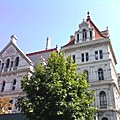- By Office of Assemblywoman Barbara Lifton
- News
 Print
Print  Assemblywoman Barbara Lifton (D/WF-125) on Wednesday attended the meeting at the NYS Department of Health (DOH) in Albany of the Work Group on Medicaid Transportation and Mobility Management. The meeting was the fourth since Assemblywoman Lifton requested the first meeting with DOH officials in June 2014, asking that they listen and respond to the concerns of local officials, particularly those in Cortland County who were seeing a significant loss of funding and ridership to their bus system. To a lesser extent, this has been a problem in Tompkins County as well.
Assemblywoman Barbara Lifton (D/WF-125) on Wednesday attended the meeting at the NYS Department of Health (DOH) in Albany of the Work Group on Medicaid Transportation and Mobility Management. The meeting was the fourth since Assemblywoman Lifton requested the first meeting with DOH officials in June 2014, asking that they listen and respond to the concerns of local officials, particularly those in Cortland County who were seeing a significant loss of funding and ridership to their bus system. To a lesser extent, this has been a problem in Tompkins County as well."I am encouraged by the hard work that everyone, including transportation staff from Cortland and Tompkins Counties, has put into this endeavor and the progress that has been made in improving the new brokerage system for Non-Emergency Medicaid Transportation (NEMT) that was implemented in 2013, and that work will continue to make further improvements," said Lifton. "However, many of our rural transit systems are still fragile from the loss of ridership and revenue as a result of the loss of Medicaid dollars to the counties. I will be strongly weighing in with Speaker Heastie and the relevant Assembly Chair this week, urging that we provide state STOA funding that ensures continued and robust operation of rural public transportation in Cortland and Tompkins counties in my district, as well as the other rural counties in Upstate New York."
DOH agreed to form a working group at the first meeting in June 2014, which includes the Assemblywoman and area Senators, representatives from both DOH and the Department of Transportation (DOT), the Governor's office, and local government and mobility managers from her district and across Upstate. At that meeting, DOH agreed to help deal with the immediate crisis by releasing $2 million in Medicaid funding to affected counties and DOT also agreed to release $1 million for that purpose. Cortland County received $214,537. Lifton explained, however, that at Wednesday's meeting, transit advocates pointed out that, while that emergency money was welcome, it mostly paid for the operating deficit transit systems had already incurred and does not help with the continuing financial stressors going forward.
The working group also discussed progress that has been made in improving the brokerage system and increasing Medicaid utilization of public transit, mostly due to the MAS buying bus tickets and having them distributed through many local agencies and organizations most-used by Medicaid recipients, such as Cortland Regional Medical Center. It was also noted that the Executive Budget proposes to spend $750,000 for DOH to hire a mobility expert who would collaborate with other state and local agencies, do a needs-assessment and make recommendations for further improvements to Medicaid transportation, including the likelihood of a pilot program.
"I am pleased that the Governor and DOH have been responsive to the local concerns in significant ways, especially given the order from the federal government to make sure the state only uses Medicaid money for Medicaid purposes and the state's self-imposed Global Cap on Medicaid spending as a result of the Medicaid Re-Design Team's work in 2012," said Lifton. "However, there is still a very clear need for an infusion of funding for Upstate rural transit, which will benefit the entire public, including those receiving Medicaid services, who have the same needs as everyone else for transportation, unrelated to medical visits," said Lifton.
"Public transportation allows people to get to work, school and a myriad of other appointments," said Lifton. "It is essential for the well-being and economic vitality of our communities. In addition, it reduces greenhouse gas emissions compared to everyone driving cars. For all these reasons, we must ensure that our public transportation systems are funded in a robust fashion."
v11i7



